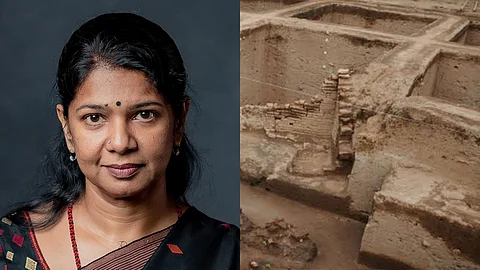

Follow TNM’s WhatsApp channel for news updates and story links.
Dravida Munnetra Kazhagam (DMK) MP Kanimozhi Karunanidhi made a written submission in Parliament on Wednesday, 23 July, urging the Union government to immediately release the long-pending Keezhadi excavation report.
Raising the issue under Rule 377, which allows Members of Parliament to draw the government’s attention to matters of urgent public importance, Kanimozhi highlighted the delay in publishing a report submitted over two years ago by archaeologist K. Amarnath Ramakrishna. She stated that the findings, based on scientifically validated methods, confirm Keezhadi as a significant urban settlement dating back to at least the 6th century BCE.
The Keezhadi excavations, located near the Sivaganga district in Tamil Nadu, were initially conducted by the Archaeological Survey of India (ASI) between 2014 and 2016.
The first two phases, led by Amarnath Ramakrishna, unearthed thousands of artefacts, including Tamil-Brahmi inscriptions, pottery kilns, terracotta objects, and tools suggesting large-scale textile production and trade. These discoveries challenged long-standing historical narratives which placed the beginning of urbanisation in South India only after the Mauryan expansion.
However, in 2017, following Ramakrishna’s transfer, the ASI halted the third phase of excavation, citing “no significant findings” in a report authored by archaeologist P. S. Sriraman. The Tamil Nadu State Department of Archaeology (TNSDA) resumed the excavations in 2018, following a Madras High Court order, and has since uncovered over 15,000 artefacts.
In January 2023, Ramakrishna submitted a comprehensive 982-page report on the first two phases to the ASI. In May 2025, the ASI returned the report, requesting revisions and raising concerns about the early dating of the site. Ramakrishna, defending his findings, based on Accelerator Mass Spectrometry (AMS) dating and stratigraphic analysis, refused to make alterations to the report.
“It must be noted that the report contains evidence based on scientific methods, including carbon dating accredited by international laboratories such as the US-based Beta Analytic Labs. Multiple experts support the findings, as they provide ample proof of authenticity. Therefore, I urge the Union government to publish the Keezhadi excavation report as early as possible, without further delay,” Kanimozhi said in her written submission.
In June, Union Minister for Culture and Tourism, Gajendra Singh Shekhawat, described the report as “not technically well supported” and claimed it required further scientific validation, a statement that triggered protests from historians, archaeologists, and political parties in Tamil Nadu.
Earlier this month, the Union government assigned PS Sriraman, who had previously concluded there were no significant findings, to draft the official report for the third phase. This decision has further raised concerns over the credibility and intent of the review process.
Ramakrishna and other experts argue that the material culture unearthed at Keezhadi bridges the chronological gap between the Indus Valley Civilisation and early South Indian urbanisation. The eleventh phase of excavation at Keezhadi is set to begin soon under the supervision of the Tamil Nadu State Department of Archaeology.